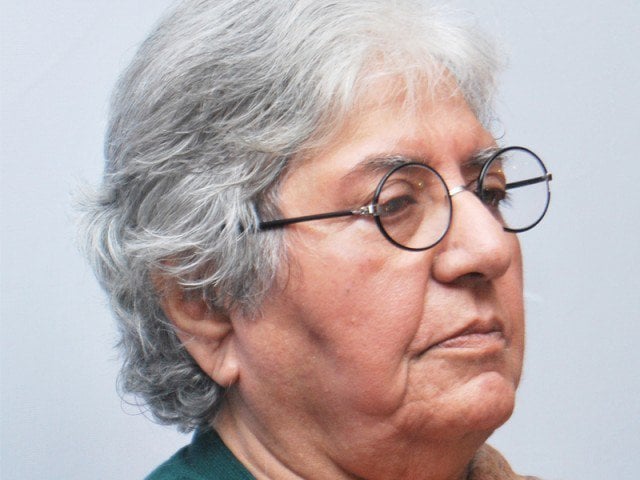
The colonization of Sindh bears many similarities to the occupation of the western areas of Palestine – Dr. Hamida Khuhro
[Translator’s note: This is a translation of renowned historian Dr. Hamida Khuhro’s comprehensive interview, originally published in the Sindhi magazine Nao Niapo, Karachi in May, 1986. The interview panel consisted of Advocate Masood Noorani (MN), Journalist Nasir Aijaz (NA) and Faqir Muhammad Lashari (FM), with Mansoor Qadir Junjo’s assistance to the interviewers. Masood Noorani also contributed observation notes from his initial meeting with Dr. Khuhro, which were used as a preamble to the interview. The interview was later included in an anthology that contained interviews of Dr. Khuhro, published in various Sindhi newspapers and magazines.
In 2021, Dr. Hamida Khuhro Foundation, Sindh (Karachi-Hyderabad) published Nao Napo magazine’s interview as a separate booklet with a title of ‘Tareekh Ji Amhon Samhon’ (Face-to-Face with History). The booklet includes a preface by Mansoor Qadir Junejo. Zaffar Junejo]
I believe that the smaller provinces and political parties should unite and exert pressure on Punjab to allow them to exercise their constitutional rights – Dr. Hamida Khuhro
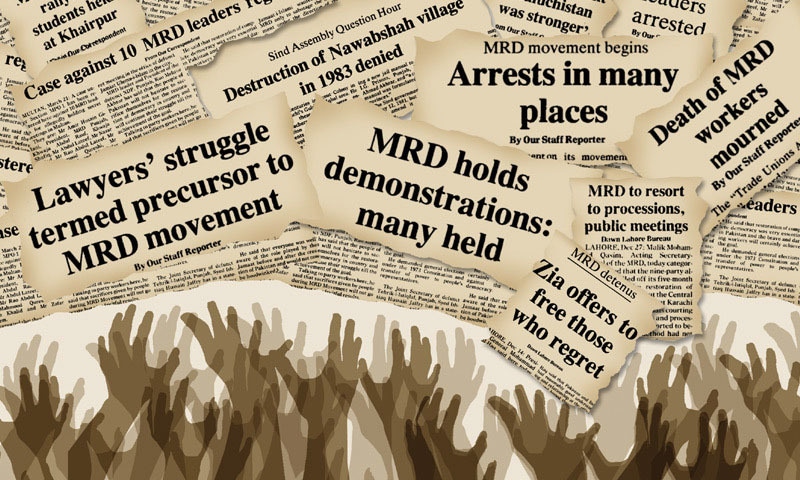
MN: Not all of them apologized.
HK: I mean a considerable number of leaders deserted the MRD movement. Ghulam Mustafa Jatoi said, “Let us forget the sour days of the past”. In a way, they said, “Now it has to be stopped”. In 1984, Sindh suffered a lot, but the information was not widely shared or communicated. I personally witnessed that the army was everywhere in Sindh – in forests and in central towns. There were many atrocities, villages were cordoned off, and people suffered greatly. Even in my own area, I saw an unusual movement of paramilitary forces. My brothers also took some measures to help people who were beaten and robbed, by the army, but nothing happened. In that situation, there were two options: one to participate in the election and, other was to boycott the elections, and do it effectively. To have an effective boycott, people needed awareness, willingness, and action. During those days, individually I met with the leaders of the MRD Movement, asked them about their plans for the boycott. Almost all of them told me that they would boycott the elections. However, when I asked them about their organizational structure, network, and number of volunteers who could engage with the people and halt the election process. All of them frankly admitted that they didn’t have such an organization or network. I told them that in such a situation, people would participate in the elections. Because, historically, casting a vote or participating in elections is the only political experience of the majority people in our part of the world, although it is a limited experience. Therefore, their limited exposure in politics condition them to show their intensions with the vote – “Yes” or “No” vote – just stamp and approve their candidates. I told the MRD leadership that if the leadership failed to convince people to boycott, then people would participate in the elections. Finally, the MRD leadership told me that they would only issue a call for boycott, but they wouldn’t be able to launch a Satyagraha campaign. However, there is a historical example, before us. It is about the constitutional reform of 1919 by the British Government, which was not considered satisfactory. In that situation, the Congress was split; one group, led by Jawaharlal Nehru, believed that they should participate in the elections under that reform. However, another faction, led by Subhas Chandra Bose and Tilak, opposed it and argued that the Congress should boycott it. Experience has taught us that those who took a middle path were relatively correct because they remained in mainstream politics and also played their role. We also faced the same situation, and none of ways were in our hands to reduce people sufferings or raise their voice. Therefore, I asked myself – ‘we forget the elections and let others, or Punjabis, be elected’. However, another option was to take part in the elections, be part of the process, and raise voice for our own cause. During the MRD Movement (1983), I was in contact with various international broadcasting houses and forums, and I updated them about the issues and sufferings of Sindh. Immediately, I realized that whenever I spoke for Sindh or represented Sindh, a common question asked by all international officials from me was that in what capacity I represent Sindh. In fact, they wanted to know – ‘am I an elected member of the assembly? Or, ‘Do I belong to any organization or institute?’ In that context, I decide to participate in the elections. Soon after that decision (in 1984), we gathered on the occasion of G.M. Syed’s birthday. On that day, I spoke and told the people that we should take part in the elections. However, it was decided that the party wouldn’t take part in the elections, but informally it was decided that individuals could take part. Therefore, some people filed their nomination papers. At that time, we were not aware of what changes would take place in the constitution. But it was clear to even a simpleton that it would be a controlled democracy, and in either case, we needed our own voice. It was felt that if we did not participate, then space would be left for others to fill. On the other hand, we were not sure how long the military would stay. Personally, I was not eager to take part in the elections, but Saeen G.M. Syed called me and said that I should take part. Therefore, I filled out the nomination form. These were the reasons for taking part in the elections. (She added with emphasis) I neither spoke to the military nor compromised on any point. Therefore, I may say that taking part in the elections was based on my own observation, review of the historical experiences, and analysis of Sindh’s ground realities.
Sindhis are being turned into minority on their own land – outsiders’ settlements are being built, and now our water is being taken away.
Sindhis needed representation, regardless of the forum’s nature. I believe there is no mistake in saying so. I see the colonization by Punjab as a mirror image of Israel. The colonization of Sindh bears many similarities to the occupation of the western areas of Palestine. Sindhis are being turned into minority on their own land – outsiders’ settlements are being built, and now our water is being taken away. Some things could have been resolved and handled after independence, but what will be left for us if we become a minority and if Kalabagh Dam is constructed? Then what will be the benefits of independence? In such a challenging situation, I am of the opinion that we should participate in elections, and simultaneously strive to achieve our original objectives.
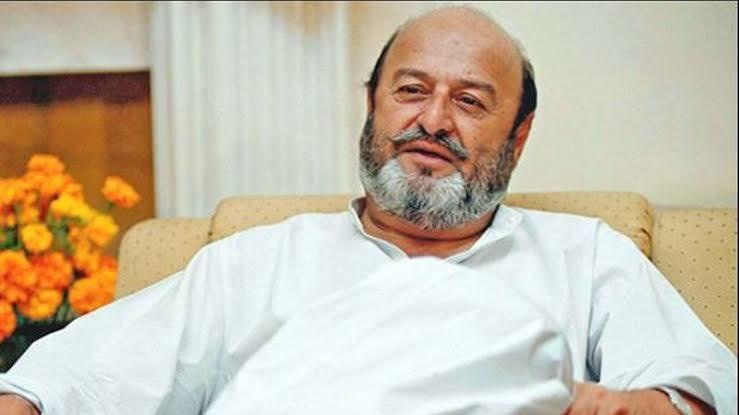
NA: Another part of this question is about your announcement to launch your own party and then withdrawing from it.
HK: Yes, initially I considered it. But soon I realized that I am not strong enough to launch a party for full independence. It was clear that my context was Pakistan, and striving for independence within that framework would invite troubles and challenges, and we would be blocked. I spoke to GM Syed, and he agreed to launch a nationalist party that operates within the framework of Pakistan. But after my announcement, he disagreed. However, I could not part ways with G.M. Syed. But in the given situation, I still support the coalition of like-minded parties. I am in favor of its formation, and I intend to contribute in whatever way I can. That is why I joined the Sindhi Baloch and Pashtun Front. Again, the intention is to gather some strength to achieve minor objectives and then work towards the major objectives.
There are many small groups and parties, and if eight to ten parties were to come together, it would become an impressive coalition
MN: It is also said that you joined the front and intended to attend the London Conference but did not. What were reasons?
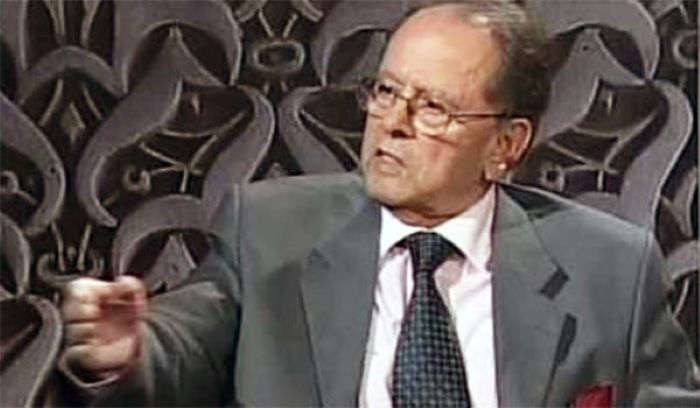
HK: I am an early member of the front, when it was known as the Sindhi Baloch Pashtun Front. At that time, one of its initial objectives was to mobilize London-based Sindhis. It was designed in that way because, there was a relatively large number of Sindhis in London, who were professionals such as doctors and engineers, although most of them were not politically active. Attaullah Mengal suggested launching the Sindhi Baloch Front. Later, Mumtaz Bhutto and Hafeez Pirzado went to London and endorsed the idea. Its aims and objectives were formulated, and the proposal for a confederation was put forward for discussion. It was a proposal, not a realistic program. It was an idea and a forum to engage and organize people. Yes, I am a member of it. When I arrived here, I noticed that the idea of the front was well-received. However, an immediate issue arose regarding whether decisions should be made in London or here. Another challenge was its organization and mobilization. I also proposed that its base should be expanded, and political parties should also become members. I suggested this because it would be beneficial for the front, and its strength could be multiplied. You see, there are many small groups and parties, and if eight to ten parties were to come together, it would become an impressive coalition. It was possible. Anyway, I am a member of the front, but I am neither an office-bearer nor can I be.
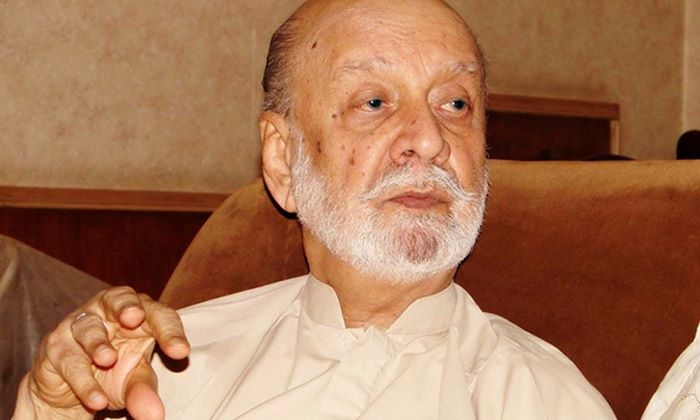
FM: If the front were to become a political party, what would be your association with it?
HK: Currently, I am with Jeay Sindh (A nationalist movement). But how could the front become a political party? I say this because it is a group of like-minded people formed for specific purposes. I believe that the smaller provinces and political parties should unite and exert pressure on Punjab to allow them to exercise their constitutional rights.
NA: Do you think that such pressure would threaten Punjab, and would it agree to the proposals of the smaller provinces?
HK: Punjab may reluctantly compromise, fearing that the situation could take a different turn.
(Continues)
Click here for Part-I and Part-II (Preamble) – Part-!II , Part-IV , Part-V , Part-VI , Part-VII , Part-VIII , Part-IX, Part-X
___________________
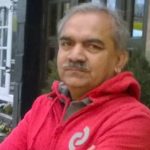 Dr. Zaffar Junejo is a historian and a writer, having earned Doctorate from the Department of History University of Malaya, Malaysia. Presently, Mr. Junejo is associated with the European University Institute, Florence, Italy. Apart from scholarly contribution, he also writes for popular media. He could be accessed at: Email junejozi@gmail.com, Cell/WhatsApp +92 334 045 5333 Skype Zaffar.Junejo Facebook facebook.com/zaffar.junejo
Dr. Zaffar Junejo is a historian and a writer, having earned Doctorate from the Department of History University of Malaya, Malaysia. Presently, Mr. Junejo is associated with the European University Institute, Florence, Italy. Apart from scholarly contribution, he also writes for popular media. He could be accessed at: Email junejozi@gmail.com, Cell/WhatsApp +92 334 045 5333 Skype Zaffar.Junejo Facebook facebook.com/zaffar.junejo
[…] – Part-!II , Part-IV , Part-V , Part-VI , Part-VII , Part-VIII , Part-IX, Part-X, Part-XI, Part-XII, […]